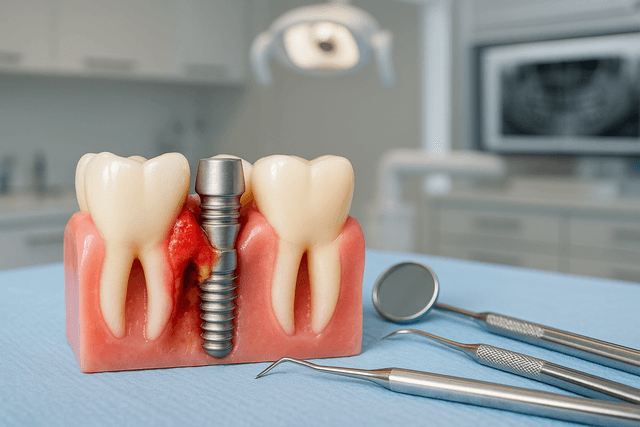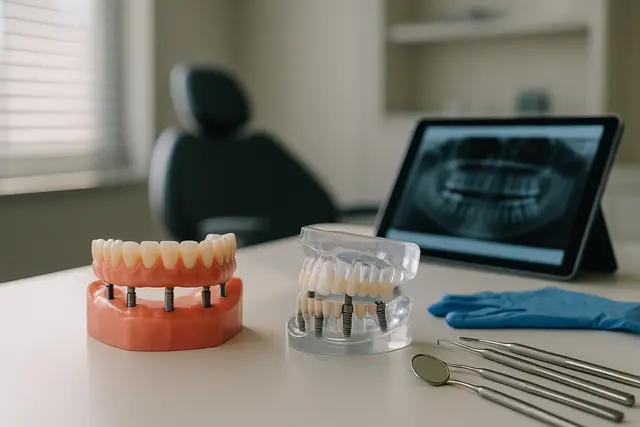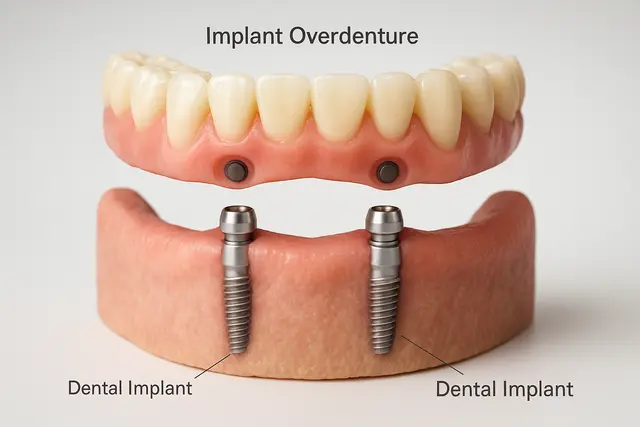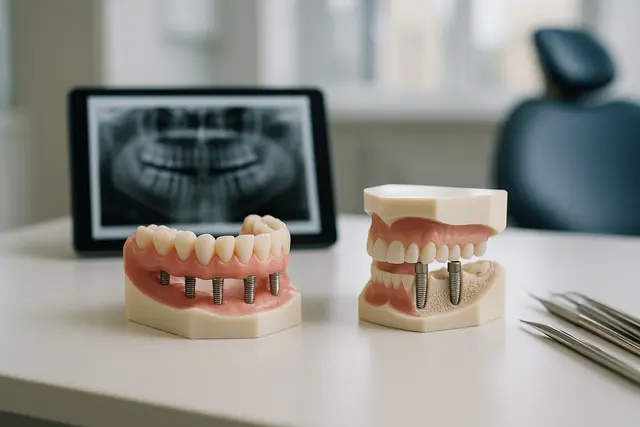Prosthodontics
5 min read
Oct 09, 2025
Dental Implant Infection Symptoms to Watch For
Dental implants are a reliable solution for replacing missing teeth, but like any medical procedure, they aren’t risk-free. One of the biggest concerns patients face is infection, which can threaten both the implant’s success and overall oral health. Recognizing the warning signs early is essential to protecting your smile and preventing long-term complications.

Dental implants are like the superheroes of modern dentistry. They swoop in to save the day when you're dealing with missing teeth, restoring both your smile and your confidence. But like any hero, even the mighty dental implant has its kryptonite, and that villain is infection.
Even though implants are built to last, they’re not invincible. Dental implant infections can occur just like with natural teeth, and if you ignore early signs, that infection can sneak in and do some serious damage. Think gum trouble, bone loss, or even full-blown implant failure if not treated.
So let’s talk about the early warning signs of an infected dental implant and what you can do to stop trouble before it starts.
What Can Infect a Dental Implant and Why It Matters
You might be wondering, “Wait, how do implants get infected? They’re not real teeth.” True, but they live in a very real and bacteria-filled neighborhood, your mouth.
One of the main causes dental implant infections is a condition known as peri-implantitis. It’s basically gum disease’s evil cousin, and it can sneak up around the implant and infect the surrounding tissue. Left untreated, it causes inflammation, eats away at the bone around the implant, and yes, can lead to implant failure.
Bad oral hygiene habits, smoking, existing gum disease, or even a reaction to the implant material can increase the risk of infection. And if bacteria build up around the implant, well, that’s a recipe for disaster.
Common Dental Implant Infection Signs You Shouldn’t Ignore
Implants can become infected quietly. But your body usually drops some hints, if you're paying attention.
Here are 5 signs something might be wrong:
Red, swollen gums near your implant site: A little redness after dental implant surgery is normal. But if the swelling around the implant site sticks around or gets worse, that’s a classic sign of infection. Watch for tenderness, puffiness, or heat in the area.
Bad breath that won’t quit: Chronic bad breath or a foul taste near your implant may not just be garlic from lunch. It could indicate an infection building up around the implant. That bacterial infection can give off some pretty funky odors.
Pain when chewing or touching the implant: Dental implants should feel like part of your natural bite. If they start hurting when you eat or when pressure is applied, especially if that pain increases over time, it might mean your implant is trying to tell you something.
Gums pulling away or bleeding easily: If the gum around the implant starts to recede or bleed when you brush and floss, it may indicate infection or inflammation. This weakens the tissue around the implant and makes it easier for bacteria to sneak in.
Loose implant or shifting bite: Your implant should be as steady as a rock. If it starts to feel wobbly or your bite suddenly feels off, it could mean bone loss around the implant. That’s one of the more serious warning signs of an infected implant and may indicate the stability of the implant is in danger.
Early Signs of Dental Implant Infection That Are Often Missed
Not all symptoms of infection come with flashing neon lights. Some are subtle, but still important.
Watch for:
Gum tenderness or strange sensations near your implant
Minor bleeding when flossing around the implant
A slight metallic taste near your implant
Light throbbing or a “pressure” feeling in the jaw
Recognizing the early signs of infection can be the difference between a quick fix and needing to replace the entire implant. Catch it early, and chances are you can save your implant.
What Causes Dental Implant Infections and How to Prevent Them
So what causes dental implants to get infected in the first place?
Here’s a quick list:
Poor dental hygiene (yep, brushing and flossing still matter)
Smoking, which lowers your mouth’s ability to heal
Pre-existing gum disease or untreated inflammation
Skipping regular dental checkups
Food or bacteria build-up around the implant
Lack of proper aftercare after dental implant surgery
The best way to prevent implant infections is to stay ahead of them. That means:
Stick to strong oral hygiene habits: brush and floss daily, especially around the implant site
Visit your dentist for regular dental checkups and deep cleaning around the implant
Avoid smoking, or at least reduce it
Let your dental team know if you feel anything “off” around a dental implant
Don’t Wait, Call Your Dentist if You Notice Any of These Signs
If you notice any of these early warning signs to watch, don’t play the “wait and see” game. Early intervention is key to stopping the infection and preventing further complications like bone loss and implant failure.
Call your dentist. Seriously. Don’t Google it and hope for the best. A dental implant infection left untreated can quickly turn into a much bigger issue, and early detection can help save your implant and avoid more costly procedures.
Your implant specialist may recommend antibiotics, a deep cleaning around the implant, or in more severe cases, minor surgery to treat the area. But the earlier you act, the more likely you’ll keep your implant healthy and avoid any long-term damage.
Implants Can Become Infected but It’s Not a Lost Cause
Here’s the deal: Yes, dental implants get infected sometimes. But most infections are totally treatable if caught early.
Good dental care and hygiene go a long way in protecting your investment. Remember, this isn’t just about your smile, it’s about your health, your confidence, and your peace of mind. Think of your dental implant like a car. You wouldn’t skip oil changes and then be surprised when it breaks down. Same logic here. Dental hygiene appointments are your implant’s maintenance plan.
So, floss like you mean it, brush with purpose, and if anything near your implant feels weird, call your dentist. Don’t risk dental implant failure over something that could’ve been fixed with a little early attention.
What Causes Dental Implant Infections?
Dental implant infections often stem from poor oral hygiene, smoking, untreated gum disease, or bacterial buildup around the implant. A condition called peri-implantitis, similar to gum disease, is a common culprit. It causes inflammation and bone loss around the implant, which can compromise its stability if left untreated. Even after surgery, skipping proper aftercare increases the risk of infection.
What Are the Early Symptoms of an Infected Dental Implant?
Early symptoms include red or swollen gums, persistent bad breath, pain when chewing, or gums that bleed easily around the implant site. You may also notice gum recession, tenderness, or even a loose implant. Sometimes the signs are subtle, like a metallic taste, jaw pressure, or minor bleeding when flossing. Recognizing these symptoms early gives you the best chance of saving the implant.
How Can You Prevent Dental Implant Infections?
Prevention starts with consistent oral hygiene: brushing twice daily, flossing around the implant, and using dentist-recommended rinses. Regular dental checkups and professional cleanings are crucial for monitoring implant health. Quitting smoking and managing conditions like diabetes also reduce risks. Following aftercare instructions closely after surgery helps the implant heal properly and lowers the chance of infection.
What Should You Do If You Suspect a Dental Implant Infection?
If you notice signs like swelling, persistent pain, or a loose implant, contact your dentist immediately. Early treatment may involve antibiotics, deep cleaning, or minor surgery to remove infected tissue. Delaying care allows the infection to spread, potentially leading to bone loss and implant failure. Quick action greatly improves the chances of saving both the implant and surrounding oral structures.
Read Next
Related Posts

Prosthodontics
Implant Supported Dentures Overview
Missing teeth can impact more than just your smile, they can affect your confidence, comfort, and even your diet. Fortunately, modern dentistry offers a solution that’s both secure and natural-looking: implant-supported dentures. This innovative approach blends the stability of implants with the convenience of dentures to create a long-lasting, life-improving upgrade.
5 min read
Oct 29, 2025

Prosthodontics
Implant Overdentures Explained: The Hybrid Solution to Missing Teeth
Missing teeth can impact everything from your ability to eat to your self-confidence. While traditional dentures have long been a go-to solution, they often fall short in comfort and stability. Implant overdentures offer a modern alternative that combines the security of dental implants with the convenience of removable dentures, a true upgrade for those looking to reclaim their smile.
6 min read
Oct 29, 2025

Prosthodontics
Implant Retained Dentures Explained
Considering implant-retained dentures? You're not alone. As modern dentistry evolves, more people are turning to this secure, natural-feeling alternative to traditional dentures. This guide will walk you through what they are, how they work, and why they might be the solution you've been looking for.
4 min read
Oct 28, 2025
Don’t have time to research every dentist around you?
See why 30k+ patients trusted us